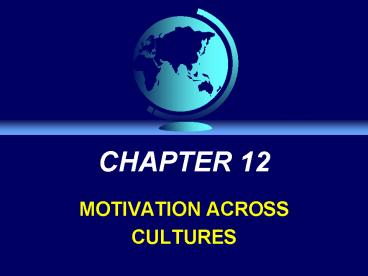MOTIVATION ACROSS - PowerPoint PPT Presentation
1 / 19
Title:
MOTIVATION ACROSS
Description:
Explain work motivation in terms of what arouses, energizes, or initiates employee behavior ... Cooperation built on intuition and pragmatism. ... – PowerPoint PPT presentation
Number of Views:94
Avg rating:3.0/5.0
Title: MOTIVATION ACROSS
1
CHAPTER 12
- MOTIVATION ACROSS
- CULTURES
2
The Nature of Motivation
The Basic Motivation Process
Unsatisfied need
Motivation is a psychological process through
which unsatisfied wants or needs lead to drives
that that are aimed at goals or incentives
Drive toward goal to satisfy need
Attainment of goal (need satisfaction)
3
- Universalist Assumption
- The motivation process is the same across
cultures but ways to motivate workers differ - Incentives
- US money Latin America - family, status
- Content Theory
- Explain work motivation in terms of what arouses,
energizes, or initiates employee behavior - Process Theory
- Explain work motivation by how employee behavior
is initiated, redirected and halted
4
Maslows Hierarchy of Needs
Self - Actualization
Desire to reach ones full potential
Esteem
Need for power and status
Social
Need to interact and feel wanted by others
Safety
Desire for security and stability
Physiological
Need for food, clothing, and
shelter
5
Maslow and Management
Self - Actualization Stress human potential, set
and achieve attainable goals
Esteem People need to feel important, promotion,
awards
Social Stress social interaction within work
groups, people become friends
Safety stress safety programs/ equipment,
medical insurance, unemployment benefits
Physiological stress salary, wages paid by
organization
Which needs are most important to international
managers?
6
Goals By Occupation
7
Herzbergs Two Factor Theory
Hygiene Factors Motivators
- Salary
- Technical Supervision
- Company Policies and Administration
- Interpersonal Relations
- Working Conditions
- Job Context
- Achievement
- Recognition
- Responsibility
- Advancement
- The Work Itself
- Job Content
8
Views of Satisfaction/Dissatisfaction
9
International Findings on Herzbergs Theory
- Motivators are more important to job satisfaction
than hygiene factors - Job content is more important than job context in
motivating employees - Managers from different cultures differ regarding
perceived importance of job outcomes and level of
satisfaction
10
Achievement Motivation Theory
Characteristics of Higher Achievers 1. Like
situations where they take personal
responsibility for finding solutions to
problems 2. Moderate risk-takers rather than high
risk-takers 3. Want concrete feedback on their
performance 4. Tend to be loners Ways to
Develop High Achievers 1. Obtain feedback on
performance 2. Emulate people who have been
successful achievers 3. Develop an internal
desire for success and challenge 4. Daydream in
positive terms by picturing oneself as successful
11
Achievement Motivation Theory
Achievement Motivation Can teach people the
need for achievement HOW? Obtain job
feedback, emulate successful achievers,
develop desire for success Leaders not always
good managers - lack human skills Herzberg
High achievement motivation people are more
interested in job motivators (content) Low
achievement motivation people are more
interested with hygiene factors (context)
12
MOTIVATION ACROSS CULTURES
MASLOW
HERZBERG
MCCLELLAND
HIGH ACHIEVERS
MOTIVATORS
SELF ACTUALIZATION ESTEEM SOCIAL SAFETY PHYSIO
LOGICAL
LOW ACHIEVERS
HYGIENE
13
Uncertainty Avoidance, Masculinity and Motivation
Masculinity index
Weak uncertainty avoidance
Weak uncertainty avoidance
Feminine
Masculine
Great Britain
Norway
Finland
Others
Uncertainty avoidance index
Japan
Strong uncertainty avoidance
Strong uncertainty avoidance
Feminine
Masculine
Hofstede says The countries on the feminine
side . . . distinguish themselves by focusing on
quality of life rather than on performance and on
relationships between people rather than on money
and things. This means social motivation quality
of life plus security and quality of life plus
risk.
14
Process Theories
- Equity Theory
- When people perceive they are being treated
equitably, it will have a positive effect on
their job satisfaction - Not universal due to cultural and status
differences - Goal Setting Theory
- Focuses on how individuals go about setting goals
and responding to them and the overall impact of
this process on motivation - Depends on goal difficulty, feedback, importance
of objective - Not universal
15
Process Theories
- Expectancy Theory
- A process theory that infers that motivation is
influenced by a persons belief that - Effort will lead to performance
- Performance will lead to specific outcomes, and
- The outcomes will be of value to the individual
- Theory appears to be culture bound
- Best in cultures where the locus of control is
high
16
Cultural Contrasts in Motivation
Emotional Appeal Recognition Material
Rewards Threats Values
17
Applying Motivation
- Job Design
- A jobs content, the methods that are used on
the job, and the way the job relates to others
in the organization - Quality of Work Life all job designs tend to
reflect the cultural values of the country - Work Centrality
- The importance of work in an individuals life
relative to other interests - Japan - Highest level of work centrality
- US and Belgium Average level of work centrality
- Britain - Lowest level of work centrality
- Burnout (stress or karoshi)
18
Job Design, Work Centrality, and Rewards
Job Satisfaction
Moving toward
Moving away from
- A more holistic, idealistic, and group thinking
approach to problem solving.
- Logical and reason-centered, individualistic
thinking.
- Viewing work as a challenging and development
activity.
- Viewing work as a necessary burden.
- An emphasis on cooperation, trust, and personal
concern for others.
- The avoidance of risk taking and the feeling of
distrust of others.
- Cooperation built on intuition and pragmatism.
- The habit of analyzing things in such great depth
that it results in paralysis through analysis.
- An emphasis on flexibility.
- An emphasis on control.
19
Applying Motivation
- Reward Systems
- Managers everywhere use rewards to motivate
performance - Significant differences exist among the reward
systems used in different countries - France and Italy Germany
- Scandinavia countries Japan
- Incentives and Culture
- Financial incentives common across cultures
- Emphases on equity and equality differs
- The effectiveness of other incentives appear to
be culturally influenced































